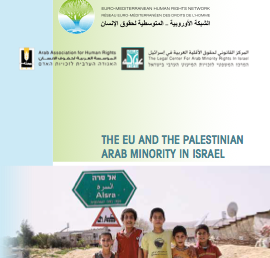Arab human rights organizations meet representatives of foreign embassies in Israel
On 12 August 2014, Palestinian Arab human rights organizations Adalah, Mossawa Center and the Arab Association for Human Rights held an extended meeting for 20 delegates of foreign embassies in Israel.
The groups informed diplomats of the human rights violations occurring against Palestinian Arab citizens in Israel in the past two months in the backdrop of Israel’s military offensive in the Gaza Strip. These acts include the increase in campaigns of racial incitement by public officials, the massive arrests of Arab citizens during anti-war demonstrations, police violence during these events, the rights violations of Arab detainees, and the rise of Arab workers being fired from employment as a result of expressing their opinions on Facebook in protest of the war on Gaza, among other subjects.
Ja’far Farah, director of Mossawa, explained that the Arab public is opposed to the war on Gaza and that they consider the targeting of civilians to be a red line that should not be crossed. Mr. Farah expanded on the violent racism practiced against residents of Arab towns and villages in the past two years, the incitement that has triggered anger on the Arab streets, and the impunity of racist and price tag attacks which reached their peak when Palestinian teenager Mohammed Abu Khdeir was kidnapped and killed in Jerusalem in July 2014. Mr. Farah also stressed that the practices of repression against the Arab community were not deterring them from protesting against the war, using their civil and political rights. They call on the international community to adopt a clear stance against the killing of Palestinian civilians in Gaza and against racial incitement towards the Arab minority in Israel.
Adalah Attorney Suhad Bishara addressed the unprecedented campaign of arrests; nearly 1,300 people from Arab towns in Israel and in East Jerusalem were arrested. Attorney Bishara explained that the clear objective behind this campaign was to suppress the wave of protests against the war on Gaza in solidarity with the Gazan people. She also addressed the arrests of minors and the violations of their rights during detention and interrogation. The minors, many of whom were arrested and interrogated in the late hours of the night, were questioned by police without the presence of a parent and before being allowed to meet with a lawyer. These practices, which violate the law, were done with the aim of obtaining confessions from them even for alleged offenses that they did not commit. Attorney Bishara also presented testimonies of detainees who suffered from police violence during the demonstrations, during their interrogation and even after their arrest.
Adalah Attorney Sawsan Zaher discussed the issue of Israeli companies and state entities that refused to enter Arab villages to provide services during the days of the protests, claiming that "the security situation did not allow them to enter Arab villages", This in turn forced many Arab citizens to wait for weeks before they could receive basic services. Attorney Zaher addressed the human rights violations that occurred against Arab workers and Arab university students in the form of dismissals and threats of suspension over the publication of anti-war views on their personal Facebook pages. Attorney Zaher stated: "This wave of racism is the result of the accumulation of racist policies adopted by the government, and the wave of racist laws enacted by the Knesset in recent years, which have now spilled over to large segments of Israeli Jewish society including employers and academic institutions."
Mohammed Zeidan, general director of the Arab Association for Human Rights, spoke about the general atmosphere of discrimination and racism that has escalated on the official levels, including the government, parliament and judiciary, in light of the ongoing war on Gaza. Mr. Zeidan stated that: "The international community’s position was not enough to stop Israel’s aggression or to deal with the issues of racism in Israel in connection with the war." Mr. Zeidan called on the embassy delegates to visit Arab towns and villages and to meet with civil society representatives of associations, political parties, and municipalities, and to put these topics on their list of highest priorities.
The meeting concluded with a Q&A regarding future work and other information related to the role of foreign embassies in these pressing issues.















.JPG)
